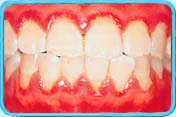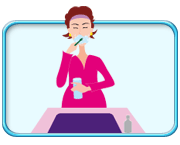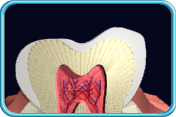

during Pregnancy
Pregnancy does not cause gingivitis. If pregnant women do not clean their oral cavity thoroughly, the hormonal changes during pregnancy may exaggerate the response of the gum tissues to the plaque bacterial toxins, resulting in red, swollen and bleeding gums. This is called "Pregnancy Gingivitis".
Gingival inflammation and gingival bleeding when brushing


Related topics:
Brushing Methods
Using dental floss
During pregnancy, an expectant mother may crave for acidic food or vomit easily. These acidic food and vomit will erode the outer layer of the teeth (enamel) and expose the inner layer (dentine), resulting in tooth sensitivity.

If the expectant mother has no tooth decay or pulp inflammation, but feels sharp pain in her teeth which is triggered by hot, cold, sour or sweet food, or by toothbrushing and flossing, she may have got tooth sensitivity.

Related topics:
Toothache and Painful Gingivae (Gums)
Tooth Sensitivity (PDF)
Pregnant woman may often crave for sweet and sour food due to dietary change. Food and drink intake may also become more frequent. Therefore, the chance of getting tooth decay may increase.

Related topics:
Tooth decay
Eat appropriately (Leaflet) (PDF)